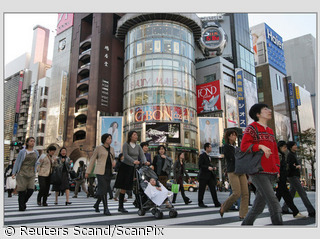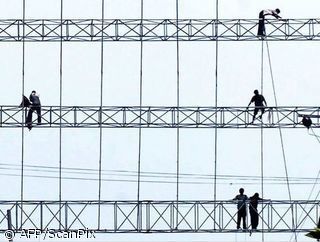And now, wearable technology. Call it wearware
Published:
28 March 2001 y., Wednesday
IBM in the jewelry business? Dutch electronics maker Philips selling street wear jackets? American high-tech start-ups creating space-age shades? Yes, yes and yes.
AT THIS YEAR’S CeBIT, IBM is showing studies of wearable computer add-ons such as a silver necklace with a hidden microphone, a lady’s display watch, earrings with speakers, and a ring whose elegant turquoise stone doubles as a nifty scroll-point mouse. Last year, Philips got together with jeans maker Levi Strauss for a limited edition of “wearable electronics garments” — jackets with a GSM mobile and an MP3 player in special pockets, with a small remote control on the front flap of the jacket and a microphone in the collar. The two devices work together, with the music turning itself off when you talk on the phone. (Available only in Europe, all 800 jackets quickly sold out). And about half a dozen companies are working on special glasses that use sophisticated optics to create screen-size images in front of your eyes.
One of the more intriguing developments in the industry is the push by some of the biggest companies into what’s become known as “wearables” — computers and accessories we can use on the go, while we’re busy doing other things. Wearables are already widespread in industry, where workers often need access to information but also need to keep their hands free. Workers building aircraft use head-mounted displays and speech-input devices for complex assembly tasks, which frees them from referring to lengthy manuals.
British Airways in experimenting with a crew of roaming check-in attendants at Heathrow’s Terminal 4, outfitted with keyboards on their forearms and a mini-display on a headset. Bell Canada sends its service technicians out to fix phone lines wearing a small computer in their pocket, a keyboard or touch-screen strapped to their wrist, and a helmet equipped with an optical display and a digital camera that beams pictures of trouble spots back to the maintenance center, wirelessly. Having quick access to precise instructions while they’re up on some telephone pole lets workers do more work in less time, says Daniel Butler, an executive at Fairfax, Virginia-based Xybernaut, maker of the wearable system BA and Bell Canada use.
Šaltinis:
NEWSWEEK
Copying, publishing, announcing any information from the News.lt portal without written permission of News.lt editorial office is prohibited.
The most popular articles
 A famous New York church is feeling Wall Street's pain.
more »
A famous New York church is feeling Wall Street's pain.
more »
 Japan may be in recession, but Tokyo remains the world's best dining city.
more »
Japan may be in recession, but Tokyo remains the world's best dining city.
more »
 The Netherlands may be famous for its liberal drugs laws but in the Dutch town of Bergen Op Zoom they've had enough.
more »
The Netherlands may be famous for its liberal drugs laws but in the Dutch town of Bergen Op Zoom they've had enough.
more »
 A European Commission report published today shows that mobile workers from the countries that joined the EU in 2004 and 2007 have had a positive impact on Member States' economies and have not led to serious disturbances on their labour markets.
more »
A European Commission report published today shows that mobile workers from the countries that joined the EU in 2004 and 2007 have had a positive impact on Member States' economies and have not led to serious disturbances on their labour markets.
more »
 South Korean stores must by law charge shoppers for plastic bags. Any infrigement would be reported to the authorities.
more »
South Korean stores must by law charge shoppers for plastic bags. Any infrigement would be reported to the authorities.
more »
 Shi Sanba is one of China's most celebrated plastic surgeon's and also dubbed the country's "Michael Jackson".
more »
Shi Sanba is one of China's most celebrated plastic surgeon's and also dubbed the country's "Michael Jackson".
more »
 The job of elected Members of any Parliament is to make laws that all of us are obliged to obey.
more »
The job of elected Members of any Parliament is to make laws that all of us are obliged to obey.
more »
 In Spain thousands have been queuing for days in the hope of gaining that crucial first step onto the property ladder.
more »
In Spain thousands have been queuing for days in the hope of gaining that crucial first step onto the property ladder.
more »
 Scores of sheep have been shepherded through Paris as part of a demonstration to improve the lives of European farmers.
more »
Scores of sheep have been shepherded through Paris as part of a demonstration to improve the lives of European farmers.
more »
 Animal rights groups say animals are suffering from abuse and sometimes live in dire conditions.
more »
Animal rights groups say animals are suffering from abuse and sometimes live in dire conditions.
more »